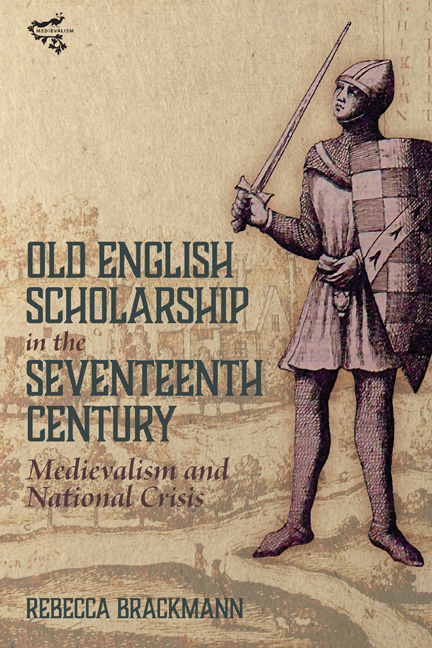Book contents
- Frontmatter
- Dedication
- Contents
- List of Illustrations
- Acknowledgments
- List of Abbreviations
- Note on Quotations
- Introduction: Medieval Studies in a Time of Crisis
- 1 Medievalism, the Self, and the World: Simonds D’Ewes and His Books
- 2 Abraham Wheelock’s Godly Historian: The 1643/1644 Bede
- 3 The Law’s Deep Roots: Roger Twysden’s Edition of William Lambarde’s Archaionomia and Leges Henrici Primi
- 4 Monuments and Memory: William Somner’s Antiquities of Canterbury and Poems on the Regicide
- 5 “The Saxons Live Againe”: William Somner’s Dictionarium Saxonico- Latino-Anglicum
- 6 The Echoing Past: William Dugdale and Early Medieval Warwickshire
- Epilogue: Texts in Conversation: John Milton’s Paradise Regained and the Old English Christ and Satan
- Bibliography
- Index
- Miscellaneous Endmatter
1 - Medievalism, the Self, and the World: Simonds D’Ewes and His Books
Published online by Cambridge University Press: 28 December 2023
- Frontmatter
- Dedication
- Contents
- List of Illustrations
- Acknowledgments
- List of Abbreviations
- Note on Quotations
- Introduction: Medieval Studies in a Time of Crisis
- 1 Medievalism, the Self, and the World: Simonds D’Ewes and His Books
- 2 Abraham Wheelock’s Godly Historian: The 1643/1644 Bede
- 3 The Law’s Deep Roots: Roger Twysden’s Edition of William Lambarde’s Archaionomia and Leges Henrici Primi
- 4 Monuments and Memory: William Somner’s Antiquities of Canterbury and Poems on the Regicide
- 5 “The Saxons Live Againe”: William Somner’s Dictionarium Saxonico- Latino-Anglicum
- 6 The Echoing Past: William Dugdale and Early Medieval Warwickshire
- Epilogue: Texts in Conversation: John Milton’s Paradise Regained and the Old English Christ and Satan
- Bibliography
- Index
- Miscellaneous Endmatter
Summary
SIMONDS D’EWES HAS less recognition as an early medievalist than Abraham Wheelock or William Somner, as none of his work saw publication. However, as a man of independent means, he was able to continue the endowment to Cambridge University that funded Wheelock's professorship and Somner's Dictionarium after the original sponsor, Henry Spelman, died. D’Ewes not only enabled the studies of other gifted scholars but read Old English himself and used that knowledge directly in the political debates of his day. A zealous Calvinist opposed to royal absolutism (although not to monarchy per se), he was an active member of the Long Parliament. He published proceedings of Elizabethan Parliaments that frequently supplied precedents for the Long Parliament's actions. He also spoke regularly in the House, often drawing on his knowledge of medieval legal and religious texts and history. His engagement with early medieval texts went beyond dabbling and became a crucial part of his self-concept as a godly Englishman. As he began to work on his own Old English dictionary (which he did not live to complete), he drew scholars from both sides of the political conflict together to reclaim England's past. D’Ewes's activities in the 1630s and 1640s show how medievalism operated in his self-fashioning and his participation in contemporary debates.
D’Ewes periodically used Old English in ownership inscriptions in his books. London, British Library Harley MS 483 is his private diary covering the period from January 1645/1646 to March 1646/1647. D’Ewes, in common with many of his fellow puritans, had already begun an autobiography that covered his life until the mid-1630s. His diaries were written with an eye to continuing that work, so they stand at a junction of public and private writing. His ownership inscriptions in Harley 483 share that status, addressing both an internal and an external audience (and as Jason Scott-Warren observes, early modern annotations in books often “do not make much sense unless we learn to think of [the book] as a quasi-public environment”). At the beginning of the manuscript, D’Ewes wrote his name, and then two inscriptions: “Moribus et vita nobilitatim homo” and “Mid hiht ic tolige.
- Type
- Chapter
- Information
- Old English Scholarship in the Seventeenth CenturyMedievalism and National Crisis, pp. 11 - 37Publisher: Boydell & BrewerPrint publication year: 2023



